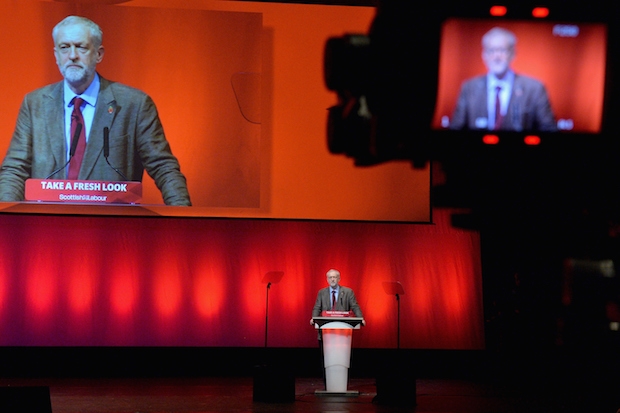Jeremy Corbyn has a problem: two thirds of voters have no idea what he is saying. In a new poll of 2,372 people, conducted by Greenberg Quinlan Rosner and prior to Corbyn’s remarks on the Paris terrorist attacks, 67 per cent say they don’t know or cannot recall what the Labour leader is saying — or that his message is rubbish, incoherent or just the opposite of whatever the Tories say (click to enlarge).
Corbyn’s position is even worse for his core audience: the non-voters. Four out of five in this group have no idea what he is talking about. More than half of those who self-identify as left-wing but didn’t vote Labour at the last general election don’t know what he is saying and only one in five say Labour’s focus is on fairness.
The failure to get a message across is a problem for both Corbyn and his enemies in Labour. For the leader, it makes it impossible to persuade the public what he stands for — after all, they can’t be won round by a message they don’t hear. Clearly, if voters don’t understand your priorities, or think you are obsessed with nuclear disarmament, they are less likely to vote for you than if they believe you’re focused on helping working people. There is no way Corbyn can win on an anti-austerity platform if just six percent of people think that is his key message.
Ironically, those on the right of Labour who want to replace Corbyn also need him to get his message across more effectively. When his leadership comes to an end, it will be easier for the party to make sense of the voters’ rejection if it is based on his political views, not operational incompetence. Otherwise, the Labour left will be unsure whether someone else from their side who is more attuned to the modern media could have done better.
If any leader needed message discipline, it’s Jeremy Corbyn. He needs to make the case to voters that austerity is wrong, and that Labour can be trusted to carry out the additional spending he advocates. At present, the electorate is more likely to want to continue austerity than end it, while 42 per cent trust the Tories on spending, compared to 28 per cent for Labour.
The scale of the task Corbyn faces is clear when you look at an obvious target group: the 12 per cent of the electorate who oppose austerity but didn’t back Labour in May. Unfortunately, this group is as likely to trust the Tories with public money as Labour, and the subset of this group that actually voted rate the Tories ahead of Labour by 35 to 32. To win them back, Corbyn needs to persuade them he would be a careful steward of the additional money he wants to spend.
To achieve this, Labour needs to focus on a domestic economic argument. This may be beyond Corbyn — in interviews he looks like a man caught between the desire to say what he thinks, and the knowledge that it won’t help him if he does so. The result is that he burbles away and gives journalists a rather different story.
James Morris is a partner at Greenberg Quinlan Rosner Research and formerly a pollster and speechwriter for Ed Miliband










Comments